A long, long time ago — by which I mean last month — I was firmly under the impression that no-one had any interest in conflating gender with biological sex. This, at any rate, was what some trans-people and many trans-activists told me and everyone else who cared to involve themselves in the boiling argument over trans rights and women’s rights.
And yet, according to Pink News it is now a ‘disgusting transphobic lie’ to assert that ‘only females get cervical cancer’. The newspaper saluted the charity Jo’s Cervical Cancer Trust for ‘shutting down’ this mistruth. The charity tweeted that ‘We’re aware a hashtag is trending that raises the issue of gender identity and cervical health. At Jo’s we want to ensure everyone with a cervix has access to the information and support they need to attend #CervicalScreening, regardless of their gender identity’.
Well, indeed. But this is surely the point. People with cervixes are biologically female, no matter their gender identification. On their own website, the charity states that ‘women are usually born with a cervix’ but you may also have a cervix if you are ‘a trans man and/or non-binary person who was assigned female at birth’. (This is also true, sometimes, of the tiny number of people classed as ‘intersex’.)
No wonder so much of this argument is so confused and so frequently consists of people talking past one another. No-one is ‘assigned’ female at birth, as though biological sex were some kind of random sorting hat, any more than anyone looks at a new baby born with a penis and says ‘Could be a boy, could be a girl, let’s assign him boy-status for now’; sex is recorded, it is not (generally), some kind of multiple-choice or pick’n’mix exercise.
From which it follows that if ‘people with cervixes’ is not quite a universal descriptor for ‘woman’ it is, as a biological matter, a useful marker for ‘female’. The logic of the Pink News argument is — if I understand it correctly — that if trans men have cervixes (as tends to be the case) it is transphobic to suggest those people are also, in at least one significant sense, biologically female.
If so, then sex is no longer distinct from gender at all and, contrary to what has so often been asserted, the conflation between the two terms is now complete. It is, whatever your views on the rights and status of trans people, the abolition of sex.
Which is something that may not bother many men but does, for all kinds of male-related reasons, trouble plenty of women. Again, there is a distinction to be drawn between the lived lives of trans people and the biological realities derived from their sex. Trans men can contract cervical cancer just as trans women can suffer from prostate cancer. In neither case is it compellingly transphobic to note these are typically female and male conditions respectively. Your cancer does not care about your gender but it is intensely interested in your sex.
And thus, as always, there are competing realities here. As a practical matter of everyday existence, trans men are — rightly — wholly at liberty to live as men and to identify as such just as trans women do so as women. Those preferences and that identity will, in the vast majority of cases, impose no great difficulty upon anyone else. As a social reality, trans men are men and their identity should be respected.
That social truth finds a partner in a legal truth by which means people may change their assigned gender and live, as an officially recognized matter, in their new/preferred/real gender. This too, it seems to me, should be respected. Trans lives are too often too difficult lives; just as the law is more understanding of their particular issues, so society should strive to be gentler — and better — too.
Biological truth is a different matter entirely. It has rules and laws of its own and they are less easily dismissed. Trans women are inherently incapable of experiencing the full biological expression of femaleness. They may be women but unless sex and gender are considered interchangeable they cannot be female. Which in turn means that while they are women they cannot quite be women in precisely the same way the overwhelming majority of women experience femaleness and, deriving from that, womanhood.
[special_offer]
If that is accepted — and it ought not to be controversial to hope it might be — then perhaps, just perhaps, the path through these thickets may be cleared. I am not persuaded Pink News have thought this through, however. Objecting to the suggestion that ‘only females contract cervical cancer’ by arguing ‘but trans men can get cervical cancer too’ does not refute, far less ‘shut down’, the argument; it proves it.
Again, that is a matter of biological truth which, once again, is — or should be — distinct from social and legal realities which are necessarily more fluid and susceptible to changing views and fashions. The argument for trans dignity is one to which fair-minded people cannot object. ‘Equal to’ is not congruent with ‘the same as’, however.
In the pursuit of the advancement of human happiness, we should all wish people to lead their lives as they truly are and be comfortable with that and secure that their reality will be respected, and even honored, by society at large. Even so, there are realities that no amount of self-willed or self-found identification can surmount.
This article was originally published onThe Spectator’s UK website.


















